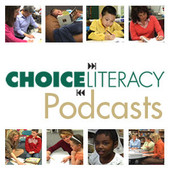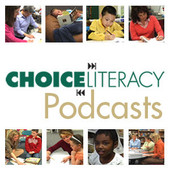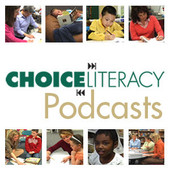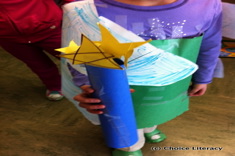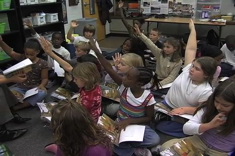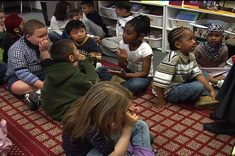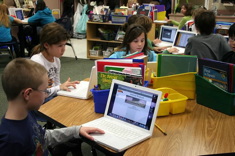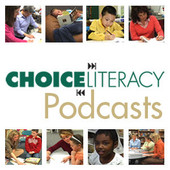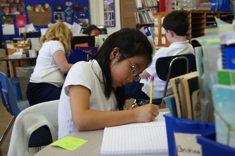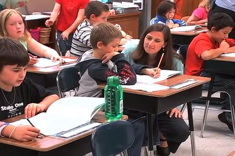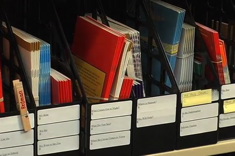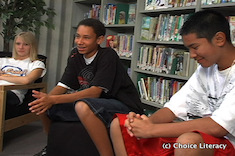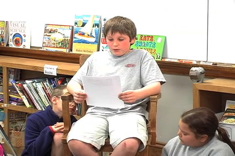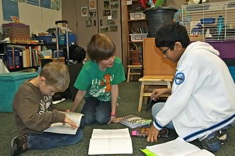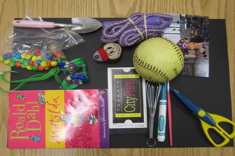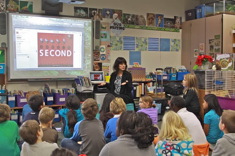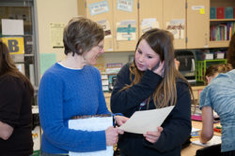Articles
Here is where you’ll find all the latest print features from our contributors. If you’d like to browse specifically by grade level, topic, or contributor, you can use the links in the right sidebar.
Latest Content
Communicating with the Y Chromosome
Heather Rader finds herself coaching a male teacher who is part of a male teaching team, and gets a lesson herself in gender communication patterns.
More Thoughtful Test Preparation: A Conversation with Patrick Allen (PODCAST)
How can teachers connect thoughtful literacy workshops with test preparation? Patrick Allen has suggestions in this podcast.
Donalyn Miller on Engaging Readers (PODCAST)
In this podcast, Franki Sibberson chats with Donalyn Miller about how she defines “engaged” reading, and the teacher’s role in motivating readers.
Patrick Carman on Books and Multimedia (PODCAST)
Patrick Carman is the author of some fascinating multimedia novels for young readers.
Readers’ Theater Revisited
Katie DiCesare becomes reacquainted with an old curricular friend. But in trying reader’s theater again in her primary classroom, she finds ways to streamline the process and foster more independence in students.
Putting the “Mini” Back in Minilessons
We know that the shorter our minilesson, the more time students will have to read and write, but it's not easy for many of us. Shari Frost has tips to shape up minilessons that have become maxilessons.
Whole-Group Share Sessions in Literacy Workshops: Essential Elements
Tammy Mulligan and Clare Landrigan found that even though the group share is the shortest part of the workshop, teachers reported many issues that needed attention. These issues can be resolved with attention to the framework, modeling and more.
Digital Reading: Another Facet of a Classroom Library
The good news? There are lots of free and low-cost digital books for young readers on the web. The bad news? The quality of many of them is mediocre at best. Andrea Smith highlights three web-based resources for digital books that are affordable and also high quality.
Clare Landrigan and Tammy Mulligan on Assessments, Data, and Balance (PODCAST)
As the data pours in throughout the year, it’s hard to keep a sense of balance and purpose. Tammy Mulligan and Clare Landrigan chat with Franki Sibberson in this podcast about data and balance.
Writing Drafts and Stamina
Stamina is a term we use often in literacy instruction, but it can be tricky for students and teachers to define in classroom contexts. Heather Rader looks at the specific attributes of writing stamina, as well as how to model it for students.
Connecting Yoga and Character Traits in Literature Study
If you are a yoga devotee, you will enjoy this feature. Ann Williams discovers yoga and literature mix beautifully as she helps her 4th grade students explore character traits.
Keeping Students Front and Center
Jennifer Allen realizes that her biggest fear as a literacy coach is forgetting to keep students at the heart of our coaching conversations. With this in mind, she shares what keeps student learning as her primary focus.
Producing Instead of Consuming: Using iPads Wisely with Students
In order for an iPad to transform teaching and learning, Tony Keefer suggests we need to think about these tools with creativity in mind. This article is packed with thoughtful resources for iPad users.
Simplexity: Finding Your Focus
Jennifer Allen visits a thriving cupcake store in Boston that doesn’t sell any cupcakes. It turns out to be the perfect example of “simplexity” – Michael Fullan’s term for maintaining focus on goals and a larger purpose. Jennifer writes about how simplexity applies to professional development planning for literacy leaders.
Clare Landrigan and Tammy Mulligan on Getting the Most Out of Grade-Level Team Meetings (PODCAST)
In this podcast, Clare Landrigan and Tammy Mulligan, the founders of Teachers for Teachers, talk with Franki Sibberson about how to link grade level team meetings with student achievement, and build stronger teaching communities at the same time.
Ready for Guided Reading? A Second Look
Shari Frost updates her original essay on guided reading with her latest thinking and criteria for placing students in guided reading groups.
High School Students Take on a Reader’s Bill of Rights
Ellie Gilbert revisits the “rights of readers” with her high school students,revising the list based on their habits and preferences. The discussion leads to some surprising additions to the list of rights. This would be a fun activity to close out the school year, or to begin a summer program with children of almost any age.
Caught in the Middle: Tween Books to Excite Readers
What does research tell us about tween readers and capturing their interest in books? Teri Lesesne’s tween booklist integrates the research with recent publications sure to interest young readers.
A Class with More Boys Than Girls
Heather Rader coaches a teacher who considers her boy/girl ratio and how it may be affecting students' understanding of directions and time on task.
Math Journals
Julie Johnson rekindles her love affair with math when she incorporates journals and sees her students become more adept at organizing and explaining their thinking.
Writers, Choice and Independence (Part II)
In this second installment of a two-part series, Aimee Buckner writes about the value of open choice writing units.
What’s Good for the Goslings is Good for the Geese: Parallels Between Scaffolding Student Learning and Scaffolding Staff Development
Terry Thompson considers the concept of “scaffolding” for both student learning and professional development.
New Books to Celebrate Poetry
Franki Sibberson shares some of her favorite new poetry collections in an annotated booklist.
Classroom Gifts from Carlos: Helping Young Students Learn Academic Language and Routines
It can be especially difficult for young children from impoverished homes to understand academic language and the demands of school. Andie Cunningham observes the sophisticated ways a preschool teacher helps her students adapt with invitational language.
Grammar Insecurity: Coaching Editing
By the intermediate grades, many students are fluent writers, but they still need a tremendous amount of help with conventions. Heather Rader writes about how teachers' insecurities about their own skills can get in the way of instruction. She also provides some practical tips for assessing and teaching grammar based on emerging student needs.
Using Jackdaws to Build Community in Kindergarten
Mandy Robek gives us the how-to as she revises a community-building project to make it a better fit for Kindergarten students.
Refining the Weekly Class Newsletter
Andrea Smith uses the school-to-home communication tool to give her writers an authentic process and audience.
Off the Dance Floor and Onto the Balcony: Getting the Big Picture in Schools
In the day-to-day triage of our schools and the sense of urgency that pushes us to always be accountable for every minute of the day, it is understandable that we tend to forget to pause to think about our larger goals. No one wants to “waste time.” This activity helps everyone keep the big picture in mind.
Language in the Classroom: Using a Recorder as a Teaching Resource
Ruth Shagoury provides tips and strategies for analyzing language in the classroom.
Coaching for the Test
Two teachers are disappointed in student assessment results, but they have very different approaches to tackling the problem. Heather Rader shares her role as a mentor in assisting her colleagues.
Browse Content By
Type
Category
- Assessment Tools
- Big Fresh Archives
- Booklists
- Choice Numeracy
- Classroom Design
- Common Core
- Community Building
- Conferring
- Content Literacy
- Digital Literacy
- English Language Learners
- Equity
- Family Relations
- Free Samples
- Guiding Groups
- Leadership
- Literacy Coaches
- Mentor Texts
- Minilessons
- New Teacher Mentors
- Podcasts
- Poetry
- Quote Collections
- Reading Strategies
- Self Care
- Struggling and Striving Learners
- Talking and Listening
- Teacher Study Groups
- Teaching Reading
- Teaching Writing
- Word Study and Vocabulary
Author
- Melissa Quimby
- Nawal Qarooni
- Gwen Blumberg
- Julie Cox
- The Lead Learners
- Hannah Tills
- Josie Stewart
- Ruth Metcalfe
- Mallory Messenger
- Becca Burk
- Jodie Bailey
- Vivian Chen
- Mary Brower
- Tiffany Abbott Fuller
- Stephanie Affinito
- Ruth Ayres
- Leigh Anne Eck
- Heather Fisher
- Shari Frost
- Julie Johnson
- Suzy Kaback
- Gigi McAllister
- Shirl McPhillips
- Melanie Meehan
- Cathy Mere
- Debbie Miller
- Tara Barnett and Kate Mills
- Tammy Mulligan
- Dana Murphy
- Bitsy Parks
- David Pittman
- Brenda Power
- Heather Rader
- Matt Renwick
- Mandy Robek
- Christy Rush-Levine
- Gretchen Schroeder
- Jen Schwanke
- Brian Sepe
- Katherine Sokolowski
- Stella Villalba
- Jennifer Vincent
Grade Level
Choice Literacy Membership
Articles
Get full access to all Choice Literacy article content
Videos
Get full access to all Choice Literacy video content
Courses
Access Choice Literacy course curriculum and training


